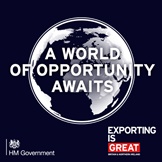
My second blog on trust (if you missed the first one you can find it here) concentrates on business relationships.
Trust is at the heart of building successful business relationships and relationship building requires slightly different approaches for different cultures.
These manifest as different attitudes to:
- time (punctuality, deadlines, response times)
- hierarchy, status and attitudes to risk (affecting decision-making, influencing and management and leadership styles)
- the individual or group (affecting the dynamics of communication in business as well as having implications for marketing and advertising).
Understanding and responding to cultural differences enables exporters to achieve mutual understanding, leading to improved efficiency and profitability.
There are several cultural models that help us understand the complexities of culture and how to adapt our communication style for different cultural contexts. One of the simplest of these models refers to low and high context cultures.
A low context culture, like the UK, USA, Germany and Switzerland is characterised by decision making and communication that is based on logic, facts and figures and business is a transactional process.
In contrast, high context cultures such as those of Japan, China and many parts of The Middle East are concerned with long term relationship-building before decisions are reached and business is done.
Understanding this allows you to prepare, manage expectations (your own and those of your buyers) and can ease some of the frustrations associated with doing business internationally. You may also wish to consider variations in attitudes to time - I wrote about this in an earlier post.
Trust in communications and marketing relationships
“A brand is the set of expectations, memories, stories and relationships that, taken together, account for a consumer’s decision to choose one product or service over another ”.
- Seth Godin, Marketing Expert
Building an international brand involves building trust through all of your marketing and communications relationships and interactions.
When planning your export communications and marketing strategy it is useful to consider every communication touch point, be it online, face-to-face, over the phone and through your written interactions.
Developing understanding about the nuances of culture and how to respond to them through your marketing and communications will help your international business to flourish. Speak to a UKTI International Trade Adviser or Language & Culture Adviser about the services available, we can provide you with one-to-one advice many aspects of your international marketing and export communications.
For further information about language and culture services, companies in the North West can contact me at sara.knowles@uktinorthwest.co.uk. Companies in the rest of the UK can find their local UKTI language and culture adviser by contacting your local UKTI office.

You can find global export opportunities on the Exporting is GREAT website. Visit the site for export leads, practical support and inspiration for UK companies who want to grow their business through export

1 comment
Comment by Kevin McGowan posted on
While I agree with the essence of the article, I feel it also highlights why UK exporters fail. There is little mention of Latin countries or how contracts and documents often mean nothing. This is an interesting topic all too briefly studied.
http://www.exportease.xyz